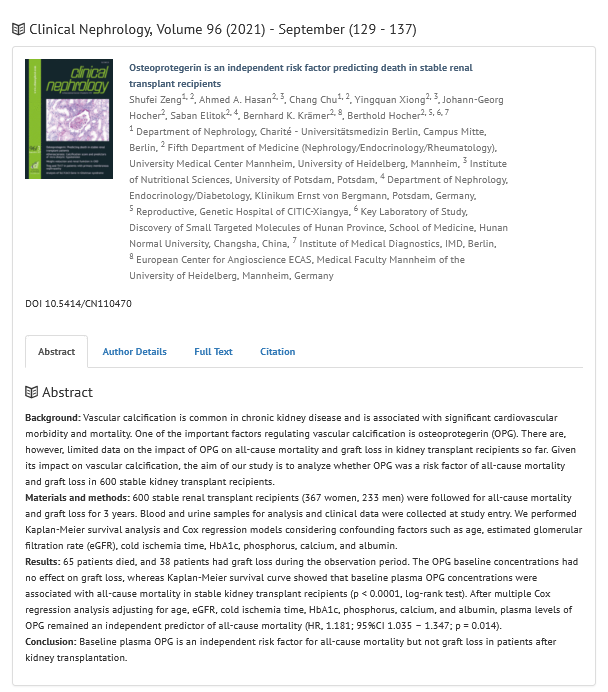24.09.2021
Osteoprotegerin is a risk factor for mortality after kidney transplantation
Clinical Nephrology, 2021
Abstract
Background: Vascular calcification is common in chronic kidney disease and is associated with significant cardiovascular morbidity and mortality. One of the important factors regulating vascular calcification is osteoprotegerin (OPG). There are, however, limited data on the impact of OPG on all-cause mortality and graft loss in kidney transplant recipients so far. Given its impact on vascular calcification, the aim of our study is to analyze whether OPG was a risk factor of all-cause mortality and graft loss in 600 stable kidney transplant recipients.
Materials and methods: 600 stable renal transplant recipients (367 women, 233 men) were followed for all-cause mortality and graft loss for 3 years. Blood and urine samples for analysis and clinical data were collected at study entry. We performed Kaplan-Meier survival analysis and Cox regression models considering confounding factors such as age, estimated glomerular filtration rate (eGFR), cold ischemia time, HbA1c, phosphorus, calcium, and albumin.
Results: 65 patients died, and 38 patients had graft loss during the observation period. The OPG baseline concentrations had no effect on graft loss, whereas Kaplan-Meier survival curve showed that baseline plasma OPG concentrations were associated with all-cause mortality in stable kidney transplant recipients (p < 0.0001, log-rank test). After multiple Cox regression analysis adjusting for age, eGFR, cold ischemia time, HbA1c, phosphorus, calcium, and albumin, plasma levels of OPG remained an independent predictor of all-cause mortality (HR, 1.181; 95%CI 1.035 - 1.347; p = 0.014).
Conclusion: Baseline plasma OPG is an independent risk factor for all-cause mortality but not graft loss in patients after kidney transplantation.
The Osteoprotegerin ELISA for the quantification of human OPG in serum and plasma samples manufactured by our Partner BIOMEDICA is available at BIOZOL´s webshop.


